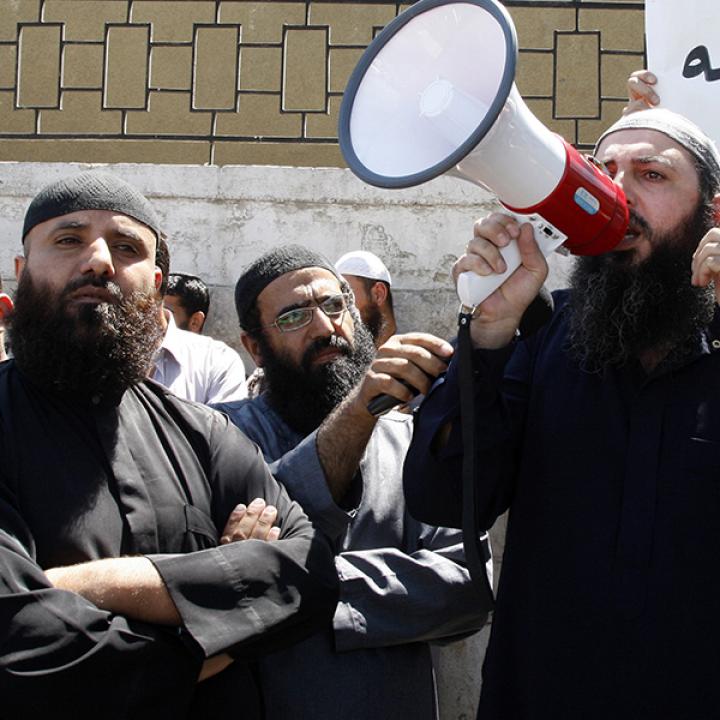

The full extent of Salafi jihadist inroads in the kingdom will likely remain unknown until the war in Syria ends, but the current indicators are troubling.
The Jordanian city of Maan is boiling. Three hours of bad road south of the capital, Amman, this underdeveloped and economically depressed tribal town of 60,000 has long been a locus of anti-government protest. But lately the natives have been particularly restive. Last June, so many locals were firing automatic weapons at the downtown police station that a decision was made to move the headquarters out of town. More recently, violent clashes between Maanis and the gendarmerie have become so ubiquitous that a tank has been stationed along the highway at city limits.
Endemic unemployment -- believed to be more than 30 percent -- is a big part of the problem. So is criminality and hair-trigger hostility toward the central government. Worse, the city's residents are armed to the teeth, and misunderstandings routinely escalate to Hatfield-McCoy proportions. Perhaps most troubling, however, has been the unprecedented growth of the Salafi jihadist movement in Maan.
An estimated 2,500 Jordanians are currently participating in the war in Syria, the largest contingent of Sunni foreign fighters battling Bashar al-Assad's nominally Shi'a regime. In the three years since the war in Syria began, about 250 Jordanians have been killed, nearly two dozen of whom have been buried in Maan. The city's status as the leading graveyard of Jordanian martyrs is confirmed by its large central mosque, which is festooned with banners of the fallen heroes.
During a recent trip there, I spent some time speaking to a young man named Farouq, whose brother Mahmoud joined the jihad this past March. Mahmoud, I was told, was a successful industrial engineer who lived as a bachelor in the port city of Aqaba, owned a home, and worked in Jordan's phosphate industry. Like everyone else in the family, Mahmoud prayed five times a day and "hated Shi'a more than Jews." Nevertheless, he was clean shaven when he left for Aqaba and showed no outward signs of affinity for Islamist militancy. Less than a year after his departure from Maan, however, Mahmoud grew a beard and became multazim, or one of "the committed," to Salafism.
Farouq said "it was a surprise" two months ago when Mahmoud called from Syria to say he had joined the al-Qaeda-affiliated group Jabhat al-Nusra and was fighting in Deraa, not far from the Jordanian border. I asked Farouq how his parents took the news. They were saddened by his departure, but not angry. "If Mahmoud dies," he said, "there will be a martyr's wedding, Allah willing." Given his enthusiasm for his brother's martyrdom, I inquired why Farouq himself didn't enlist in the jihad. "I thought about going," he said, "but I'm married."
While Farouq isn't fighting, others from Maan are, apparently at the behest of local clergy who have been preaching that the jihad in Syria is a fard 'ayn, or a Quranic injunction. Meanwhile, Farouq is hoping that after Assad is defeated, Jabhat al-Nusra will establish an Islamic state in Syria -- and eventually in Jordan. "Secularism," he says, "is dangerous."
Just how many Maanis share Farouq's aspirations for Syria and Jordan is unclear. To be sure, I met a broad range of folks in Maan who disparaged and downplayed the Salafi jihadist phenomenon. Indeed, most people I encountered said that the actual number of Salafi jihadists was relatively small, and that unemployment, official corruption, and the government's heavy-handed response to protests were more urgent concerns.
Some Maanis even suggested that Amman was exaggerating the threat to exact higher rents from the West. Why else, I was asked, would the palace allow Abu Sayyaf, the Maan-based leader of Jordan's Salafi jihadi movement, to remain at large, proselytizing unconstrained from the city?
Of course, Maan isn't the only city in Jordan that has witnessed jihadi funerals and popular foment in recent years; it's just the most prominent example of the trend. And the arrival of nearly a million refugees from Syria over the past three years is all but certain to add to the growing list of social and economic grievances of average Jordanians. Economic hardships and other self-inflicted wounds -- such as the draconian new counterterrorism law and restrictions that led Freedom House to downgrade Jordan's freedom-of-the-press ranking -- could ultimately make the kingdom an even more conducive environment for al-Qaeda recruitment.
These days, Jordanian officials are attributing unrest in Maan to a criminal element in an isolated and habitually recalcitrant tribal redoubt. To be sure, Maan has long been a challenge to govern, but the addition of Islamic radicalism to the already incendiary mix will further complicate efforts to pacify the city. With no end in sight to the sectarian war in Syria, an increasing number of Sunni Muslim Jordanians -- in Maan and throughout the kingdom -- may be tempted to join the jihad.
Last month, Western concerns about foreign fighters spiked after an American-born suicide bomber detonated in Syria and a former French jihadi attacked Jewish tourists in Belgium. With the Islamic State in Iraq and Syria (ISIS) now controlling vast tracts of territory in these states, Sunni Islamist militancy in the Middle East has become a central concern for the West and its regional partners.
For Jordan, a regime historically targeted by al-Qaeda for its close relations with the United States, the threat is increasingly proximate. Still, the extent of Salafi jihadi inroads in the kingdom will likely remain unknown until the war in Syria ends and these battle-hardened foreign fighters return home. If the problem turns out to be as pervasive as it now seems to be, the first sign may be an uptick in terrorism in Jordan.
David Schenker is the Aufzien Fellow and director of the Program on Arab Politics at The Washington Institute.
American Interest



